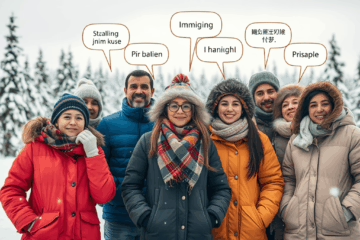Over recent years, Canada has become a safe haven for individuals from all corners of the globe fleeing violence, persecution, or hardship. Among these individuals are Mexicans, some of whom seek refugee status due to conditions in their home country. The journey to finding stability and safety as a Mexican refugee in Canada comes with its own unique challenges, from navigating the asylum process to adapting to a new environment and culture.
Table of contents
- Understanding Refugee Status in Canada
- The Asylum Process: Steps and Requirements
- Eligibility Criteria
- Why Are Mexicans Seeking Refuge in Canada?
- Challenges Mexican Refugees Face in Canada
- Support Systems and Resources for Refugees
- Success Stories and Contributions to Canadian Society
- Moving Forward: What Lies Ahead for Mexican Refugees in Canada?
- Frequently Asked Questions
Understanding Refugee Status in Canada
Canada offers protection to individuals who qualify as refugees under the United Nations Refugee Convention. Refugees must demonstrate a “well-founded fear of persecution” due to factors such as race, religion, nationality, political opinion, or membership in a particular social group. For many Mexican refugees, the main reasons cited include organized crime, threats of violence, or systemic challenges within certain regions. Canada recognizes that while some may be fleeing generalized violence or insecurity, others face specific risks that can make refugee protection appropriate.
The Asylum Process: Steps and Requirements
The Asylum Process: Steps and Requirements
Mexican nationals who arrive in Canada or cross the border can apply for asylum by submitting a claim to the Immigration and Refugee Board of Canada (IRB). The IRB assesses each claim on an individual basis, examining evidence of the applicant’s need for protection. The process includes:
- Eligibility Determination: The IRB first evaluates whether a claim meets initial criteria for consideration, such as not having already applied in another safe country.
- Gathering Documentation: Claimants need substantial documentation to support their case, which may include police reports, medical records, or personal testimonies describing threats.
- Hearing: Most applicants have a hearing where they provide detailed information on their circumstances, often with the support of a legal representative.
- Decision and Appeals: If the IRB accepts the claim, the claimant may become a protected person, eligible to apply for permanent residency. In cases of denial, there are limited avenues for appeal or reconsideration.
Eligibility Criteria
To be eligible for refugee status in Canada, applicants must meet specific criteria defined under Canadian and international law. The process ensures that only those with genuine protection needs receive asylum. Here’s a closer look at the eligibility criteria:
1. Fear of Persecution or Risk to Life
- To qualify as a refugee, applicants must demonstrate a well-founded fear of persecution due to race, religion, nationality, political opinion, or membership in a particular social group (including sexual orientation or gender identity).
- Alternatively, applicants may qualify as “persons in need of protection” if they risk torture, a threat to life, or cruel and unusual treatment in their home country.
2. Residency Outside Canada (Convention Refugees)
- Refugee claimants who are already outside Canada apply as Convention Refugees through Canada’s Refugee and Humanitarian Resettlement Program. This program is for individuals referred by the UN Refugee Agency or other designated groups for resettlement in Canada.
- Refugees accepted into this program generally undergo security screenings and health checks before coming to Canada.
3. Inside Canada (Asylum Claimants)
- Those already in Canada can apply for asylum if they can prove they have grounds for protection. These individuals submit their claims directly to the Canadian government upon arrival or while already residing in Canada.
- Claims are assessed through the Immigration and Refugee Board (IRB), where applicants must provide documentation and attend a hearing to substantiate their case.
4. Ineligibility Factors
- Criminal Record or Security Risk: Applicants with a serious criminal background or deemed a security risk may be ineligible for refugee protection in Canada.
- Previous Asylum Claims in Canada: If an applicant previously filed a refugee claim in Canada and it was rejected, they are typically ineligible to apply again.
- Safe Third Country Agreement: Due to an agreement with the United States, individuals who arrive in Canada via the U.S. border are generally required to seek asylum in the U.S., with a few exceptions, such as having family in Canada.
- Other Safe Country Applications: Individuals who have protection in another safe country (e.g., citizenship or residency) cannot apply as refugees in Canada.
5. Exceptions and Humanitarian Considerations
- In some cases, the Canadian government considers humanitarian and compassionate grounds for those who do not meet refugee eligibility but face extreme hardship if returned to their country.
The eligibility determination is rigorous, ensuring that those genuinely at risk receive protection. Successful claimants may stay in Canada as protected persons and eventually apply for permanent residency.
Why Are Mexicans Seeking Refuge in Canada?
While Canada and Mexico share robust diplomatic and economic ties, certain regions in Mexico face challenges that make daily life unsafe for some individuals and families. Violence linked to organized crime, including extortion, kidnapping, and violent conflicts, impacts many communities. Additionally, some groups within Mexican society, such as women, Indigenous communities, and LGBTQ+ individuals, may experience discrimination, gender-based violence, or marginalization that drives them to seek refuge abroad.
Challenges Mexican Refugees Face in Canada
Refugees often encounter numerous obstacles as they navigate life in a new country. For Mexican refugees in Canada, these challenges can include:
- Cultural and Language Barriers: Adapting to a new culture while facing language differences can be overwhelming. While Canada provides language training and settlement services, these adjustments can take time.
- Legal and Bureaucratic Hurdles: Understanding Canadian laws, especially those surrounding employment, healthcare, and education, can be complex without sufficient support.
- Mental and Emotional Strain: Many refugees bear the trauma of difficult experiences and may need psychological support to overcome the impact of these events.
- Employment and Economic Integration: Securing stable employment and financial stability can be difficult due to language skills, limited networks, and, in some cases, the qualifications required in Canada.
Support Systems and Resources for Refugees
Canada has an extensive network of programs and organizations aimed at supporting refugees during their transition. These include:
- Settlement Services: Nonprofits and government agencies offer assistance, from language courses to help finding housing and employment. Organizations like the Immigrant Services Society of British Columbia (ISSofBC) and Catholic Crosscultural Services (CCS) have dedicated programs for refugees.
- Legal Aid and Advocacy: For those who cannot afford private legal representation, Canada offers legal aid services to ensure that refugees can access fair hearings and due process.
- Health and Psychological Support: Refugees have access to the Interim Federal Health Program, which provides essential health services. Some provinces also offer additional mental health support to help refugees cope with trauma and stress.
Success Stories and Contributions to Canadian Society
Mexican refugees have brought resilience, skills, and diverse perspectives to Canadian communities. Many build successful lives, opening businesses, contributing to local economies, and enriching Canadian culture. Whether through Mexican cuisine, cultural festivals, or arts, Mexican refugees add valuable diversity and foster cross-cultural understanding.
Moving Forward: What Lies Ahead for Mexican Refugees in Canada?
As Canada continues to embrace individuals seeking safety, the path forward for Mexican refugees will depend on a fair and efficient asylum system, comprehensive support for integration, and awareness of the unique challenges they face. Advocacy remains crucial to ensure refugees have a fair chance at rebuilding their lives.
For Canadians, supporting refugee communities involves more than policy and services; it’s about extending a welcoming hand and recognizing that every refugee story is one of courage, hope, and perseverance.
Frequently Asked Questions
Q: What is a refugee? A: A refugee is someone who flees their home country due to persecution, violence, or other threats to safety, seeking protection in another country.
Q: Can Mexicans apply for refugee status in Canada? A: Yes, Mexican nationals can apply for refugee status in Canada if they meet eligibility requirements and have a well-founded fear of persecution.
Q: What are the main reasons Mexican nationals seek refugee status in Canada? A: Common reasons include fleeing organized crime, violence, persecution, and threats to personal safety in specific regions of Mexico.
Q: What is the eligibility criteria for refugee status in Canada? A: Applicants must demonstrate a fear of persecution or risk to life due to factors like race, religion, nationality, or political opinion.
Q: Can someone apply for asylum at the Canadian border? A: Yes, individuals arriving at the Canadian border can request asylum and start the refugee claim process.
Q: What is the Safe Third Country Agreement? A: It’s an agreement between Canada and the U.S. stating that asylum seekers must apply for refuge in the first safe country they enter, with some exceptions.
Q: Do Mexican refugees have access to legal aid in Canada? A: Yes, refugees in Canada may be eligible for legal aid services to support their asylum claims.
Q: How does Canada assess refugee claims? A: Canada’s Immigration and Refugee Board (IRB) evaluates claims, requiring applicants to provide documentation and attend a hearing.
Q: What documents are needed for a refugee claim in Canada? A: Documents may include personal identification, police reports, medical records, or other evidence supporting the claim of persecution.
Q: Are refugees in Canada eligible for healthcare? A: Yes, refugees are eligible for healthcare through the Interim Federal Health Program, which provides essential medical services.
Q: Can a Mexican refugee in Canada apply for permanent residency? A: Yes, successful refugee claimants can apply for permanent residency in Canada once they gain protected person status.
Q: How long does it take to process a refugee claim in Canada? A: The process time can vary but generally takes several months due to document verification and IRB hearing schedules.
Q: What organizations support Mexican refugees in Canada? A: Organizations like the ISSofBC, Refugee 613, and local nonprofits offer settlement services and support for refugees in Canada.
Q: Is mental health support available for refugees in Canada? A: Yes, mental health support is often provided to help refugees cope with trauma and adjust to life in Canada.
Q: What challenges do Mexican refugees face in Canada? A: They may encounter language barriers, cultural adjustment, economic challenges, and the need for legal assistance.
Q: Can family members of a refugee join them in Canada? A: Refugees may apply to reunite with family members, but specific criteria must be met for family reunification.
Q: Can refugees work in Canada? A: Yes, once approved, refugees are eligible for work permits, allowing them to seek employment in Canada.
Q: Are refugees required to learn English or French in Canada? A: While not required, language programs are available to help refugees integrate and access employment and social services.
Q: What is Canada’s resettlement program for refugees? A: Canada’s Refugee and Humanitarian Resettlement Program offers protection for refugees referred by the UN Refugee Agency or other organizations.
Q: Do refugees pay taxes in Canada? A: Yes, refugees in Canada are required to pay taxes on income earned, just like Canadian citizens and residents.
Q: Can Mexican refugees in Canada study in schools and universities? A: Yes, refugees have access to educational institutions, and young refugees can attend public schools free of charge.
Q: Is housing support available for Mexican refugees in Canada? A: Various organizations assist refugees in finding temporary or affordable housing during their initial settlement period.
Q: Are refugees allowed to travel outside Canada? A: Yes, but travel restrictions apply, and refugees need a Refugee Travel Document issued by Canada for international travel.
Q: Can a refugee claim be denied in Canada? A: Yes, if the IRB finds that the applicant does not meet eligibility criteria, the claim may be denied, though appeals may be possible.
Q: What happens if a refugee claim is denied? A: Denied claimants may be required to leave Canada or file an appeal or request a judicial review in specific cases.
Q: Can Mexican refugees bring their cultural traditions to Canada? A: Absolutely. Canada values cultural diversity, and Mexican refugees are encouraged to maintain their traditions and participate in multicultural events.
Q: Are refugee children eligible for Canadian citizenship? A: Refugee children, like all protected persons, can apply for Canadian citizenship once they obtain permanent residency and meet residency requirements.
Q: How can Canadians help Mexican refugees? A: Canadians can volunteer with organizations that support refugees, donate to refugee services, or advocate for fair policies.
Q: Are there financial assistance programs for refugees in Canada? A: Some provincial programs and nonprofits offer financial support to help refugees meet basic needs as they establish themselves in Canada.
Q: What are the benefits of having refugees in Canada? A: Refugees enrich Canadian society with their skills, culture, and contributions, fostering diversity and economic growth.
Important: Please note that the information here is not meant to be legal advice. Do not solely rely on the information given here; it is important that you consult with a lawyer regarding any legal advice. Pax Law Corporation is not responsible for any reliance on the contents of this blog post. Any faces posted on this blog post is totally AI generated and they are not intended to represent any person in the real world. Any similarities are completely coincidental.
Discover more from Pax Law Corporation
Subscribe to get the latest posts sent to your email.



0 Comments